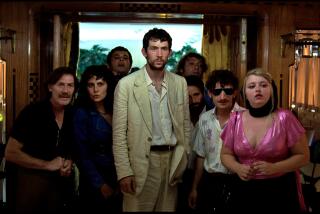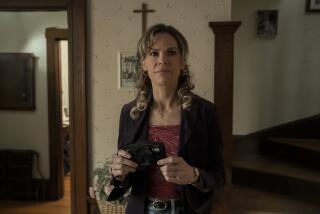Review: Eugène Green’s ‘The Son of Joseph’ puts a beguiling French twist on the Nativity
A tale of love and mercy, a modern-day Nativity story and a divine comedy in every sense, “The Son of Joseph” finds the American-born, Paris-based filmmaker Eugène Green in a wonderfully playful mood. Divided into five chapters, each one with a Bible-inspired title, this intellectually vibrant, sneakily emotional film unfolds in and around the French literary world — a place where the sins of the fathers cry out for expiation much as they do everywhere else and are answered by a most unexpected form of redemption.
A sullen teenager named Vincent (splendid newcomer Victor Ezenfis) lives in Paris with his mother, Marie (Natacha Régnier). Selfless in her love for her son, Marie has never told him the identity of his father, who abandoned her years ago when she became pregnant. But Vincent is determined and resourceful enough to figure it out: The ne’er-do-well who spawned him is a powerful publisher named Oscar Pormenor (Mathieu Amalric, a perfect heel), whose devilish, philandering ways have sowed plenty of heartache.
Vincent cuts school to spend some time secretly observing Oscar in his elite literary habitat, in scenes that are played for bawdy comedy and loopy satire (Maria de Medeiros pops up as a genially clueless literary critic). Confronted with ample evidence that his biological dad is unfit to inhabit the earth, Vincent hatches a violent revenge scheme that — in a moment that evokes any number of Old Testament confrontations, from Abraham and Isaac to Saul and David — doesn’t go exactly as expected.
But then, nothing until this point has gone as expected in “The Son of Joseph,” whose dry, deadpan style achieves an almost perfect balance of high culture, low humor and warm, sympathetic imagination. Like most of Green’s earlier works, including 2015’s exquisite “La Sapienza,” the film is steeped in a deep love of Baroque artistic traditions, existing as both a monument to its maker’s erudition and a heartfelt invitation to escape the ugliness and mundanity of modern life.
There is more to this invitation than, say, a day trip to the Louvre or a lovely performance of a Domenico Mazzocchi piece, although Green, generous as ever with his enthusiasms, treats Vincent and the viewer to both. There is also the director’s signature method of having his actors address themselves directly to the camera, framed in perfectly symmetrical shot-reverse-shot compositions and speaking syntactically perfect French. It’s a formal conceit that owes something to Green’s theater background and something to the austerity of Robert Bresson, who famously sought to drain all traces of “acting” from his performers’ faces.
Bresson, as it happens, was also a key influence on the great Belgian neorealist filmmakers Jean-Pierre and Luc Dardenne, who are among “The Son of Joseph’s” producers. None of these artists could be accused of making the same kinds of movies, yet their work is nonetheless marked by a profound insistence that transcendence can be found in the everyday. What makes Green’s work so singular is that he reaches this exalted state through decidedly artificial, even whimsical means.
Vincent may not be the first teenager to contemplate patricide, but he is almost certainly the first one inspired to do so by an enormous reproduction of Caravaggio’s “Sacrifice of Isaac” hanging on his bedroom wall. It’s not surprising that Green, working with the cinematographer Raphaël O’Byrne, invites us to scrutinize the painting at length — not because it conceals any additional narrative clues (Dan Brown this isn’t), but because its darkly suggestive and haunting imagery is worthy of contemplation for its own sake.
But if “The Son of Joseph” believes fervently in the restorative properties of painting, music and architecture, it is no less sincere in its affirmation of the redemptive power of human relationships. The film’s key epiphany, its moment of Damascene deliverance, arrives courtesy of an older man named Joseph (Fabrizio Rongione, “La Sapienza”), a man from Normandy who is unexpectedly drawn into Vincent’s plot.
Vincent and Joseph become fast friends, at which point the film becomes not just a fanciful biblical riff but a fluid and intricate theological fantasia — and that’s before the donkey shows up (more shades of Bresson). It’s also here that the story’s delicate emotional layering begins to pay off, as Ezenfis, Régnier and Rongione uncover deep reservoirs of feeling within their deliberately constricted acting style. The movie’s tonal juggling act intensifies when the farcical complications involving Vincent’s biological dad suddenly escalate, and yet even Amalric’s dastardly Oscar is granted his unexpected measure of grace.
Green, who has a brief role as a helpful concierge, may be in thrall to the Baroque, but his ability to merge so many disparate and inventive impulses into a unified, harmonious whole is his and his alone. “The Son of Joseph” transforms from a lark into a revelation in its final scenes, which are piercing, absurd and pretty close to miraculous.
------------
‘The Son of Joseph’
Unrated
In French with English subtitles
Running time: 115 minutes
Playing: Laemmle’s Royal Theatre, West Los Angeles; Laemmle’s Playhouse 7, Pasadena
See the most-read stories in Entertainment this hour »
Movie Trailers
More to Read
Only good movies
Get the Indie Focus newsletter, Mark Olsen's weekly guide to the world of cinema.
You may occasionally receive promotional content from the Los Angeles Times.







